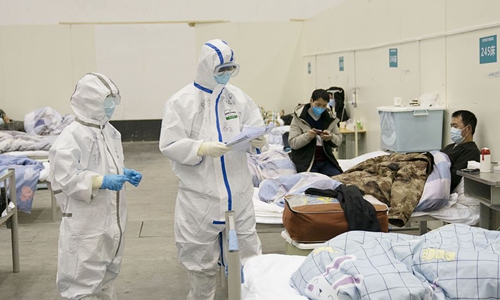HOME >> CHINA,SPECIAL-COVERAGE
District announces wartime control mode
By Xu Keyue, Zhao Yusha and Guo Yuandan Source:Global Times Published: 2020/2/13 13:12:01

Medical staff check a patient's condition at a temporary hospital converted from "Wuhan Livingroom" in Wuhan, central China's Hubei Province, Feb. 10, 2020. (Xinhua/Xiong Qi)
A district in Shiyan, Central China's Hubei Province announced wartime control measures for the next 14 days, including the full closure of all buildings, the first time in China during the national fight against the COVID-19 outbreak, which experts said is inappropriate administrative actions.
The district started wartime control measures from Thursday, demanding all its buildings be fully closed and residents not leave their homes except those who are fighting the epidemic, according to an announcement published by the COVID-19 epidemic control department on the local government's WeChat on Wednesday evening. All residential areas are being manned around the clock.
Whether the control measures will be lifted or continue depends on their effectiveness.
The wartime control measures were put in place after the district reported 137 confirmed cases of infection with the COVID-19, the second highest number in the city of Shiyan, where 562 were reported as of the end of Wednesday. Shiyan has reported one death from the disease.
Local neighborhood committees will distribute basic necessities at a fixed time and fixed prices. The committees will help residents purchase medicines if they are urgently needed.
Those who force their way into or out of residential areas, courtyards, buildings and roads will be detained, it said.
Public security organs will help manage the campaign. Local Party officials must unconditionally obey the leadership and instructions of the local committees and participate in epidemic prevention work.
People suffering from fever or having come into close contact with infected patients will be sent to a medical observation point in the district.
Hubei reported 48,206 confirmed cases, 32,994 of whom are from Wuhan, where the virus originated. Shiyan ranks 11th in Hubei.
The controls were implemented to reduce the flow of people, to force the sources of the disease to be exposed, to curb the epidemic spread and prevent a long-term war of attrition, said the announcement.
The announcement said the controls are in accordance with the law on public security management, the law on prevention and treatment of infectious diseases and regulations on urgent responses to public health emergencies.
After Shiyan, Dawu county of Xiaogan city in Hubei also announced on its government website it would adopt the similar measure.
But the legitimacy of the wartime control was under question.
Li Qingshan, a lawyer in Beijing, told the Global Times that the district government doesn't have the right to call the measures "wartime control."
An expert at China University of Political Science and Law echoed Li, saying "the move is a sign that the local government overexerted."
An anonymous expert explained to the Global Times what wartime control is, saying that the authorities responsible for crisis management and control of national security have the right to take special measures to limit the rights of residents and organizations and increase their obligations after the country decides to enter a state of emergency, of wartime, or of national defense mobilization.
According to China's Criminal Law, wartime refers to the time when a country declares a state of war, troops take over combat missions or are suddenly attacked by the enemy. When troops perform martial law tasks or deal with emergency violence is also regarded as wartime, the law said.
China's Constitution said the Chinese President can declare a state of emergency or of war in accordance with the decisions of the National People's Congress and its standing committee.
The National Defense Mobilization Law said special measures could be taken in some areas within the province after being approved by the State Council and the Central Military Commission, and shall be implemented by the provincial government and the military organs at the same level.
Also, another observer, Liu Yuanju, a Shanghai-based commentator, questioned the necessity of the control, saying Shiyan only had one death from the virus and more than 500 confirmed cases, which is much less than in Wuhan.
Posted in: SOCIETY,FEATURE